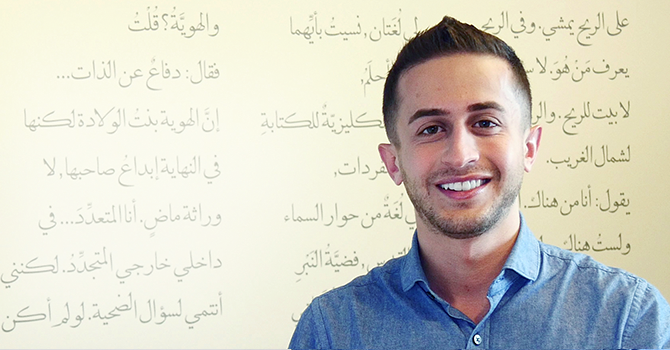Ali Abazeed

Ali Abazeed
MPH '17, Health Behavior and Health Education
My parents are Syrian refugees. My dad was a professor in Syria. He was forced out of the country in the '70s for publically criticizing the human rights record of the Syrian government, and my parents fled to Algeria and then the U.S. I was born and raised in Dearborn. But I feel very connected to refugees through my parent's experience.
I've always wanted to serve the public. I majored in neuroscience in undergrad and was on a pre-med track, but I was never really into it. After college, I took a couple years off to figure things out and did some work with refugees—at that point the refugee crisis wasn't a major news story the way it is today. I was torn between pursuing a career in medicine and devoting my career to improving the newfound realities refugees found themselves in.
I decided to apply to medical school and start working on my MPH. A month and a half into my program at the School of Public Health, I withdrew my medical school applications. As a physician, you're more of a mechanic, working one-on-one with patients. But in public health, I saw a field with such potential that would allow me to scale social impact more broadly by working to improve population health policy.
I spent my School of Public Health internship in the refugee camps of Lebanon. It was an enriching experience, but a really tragic one too.
I'm sensitive to this idea of parachute researchers, who just go somewhere to extract data. It was difficult to go into the refugee camps and talk to them about studies we were conducting around maternal health. What does it mean to them? I realized then the challenges of on-the-ground relief work. I was more interested in changing the condition in a broad sense.
In Lebanon, I met a 17-year-old Syrian refugee who was wearing a bunch of wristbands on his arm showing off Lebanese pride. It was a curious sight. He said, "I do this so that one day I'll get lucky enough that they won't think I'm Syrian and they'll let me through the checkpoints." He then asked me if I had an American passport, to which I said yes. He looked off in the distance with a look of amazement and said, "to be you." That experience really impacted me and put into context my privilege as a U.S. citizen and passport holder.
I was fortunate to be selected as a Presidential Management Fellow. For the next couple years, I'll be working with the federal government in a really interesting time in the history of our country. I want to gain a valuable skill set so that, a few years from now, I'm able to take those skills and experiences and work towards the public good for the most marginalized in society.
I'm terrified of the prospect of one day looking back and realizing that I didn't do all I could to serve the public. When I was 16, I survived a very bad car crash. I like to think I'm on borrowed time—it drives my passion in helping people.
What gives me hope is that people at the School of Public Health are here and not elsewhere because they believe in this idea of helping to advance the public's health. That inspires me. Despite the cynicism that exists today in America, there is so much hope in the work we do and I am motivated every day by my colleagues here.
- Find out more about Health Behavior & Health Education and our commitment to Global Public Health.
- Support students like Ali.
- Interested in public health? Learn more here.
